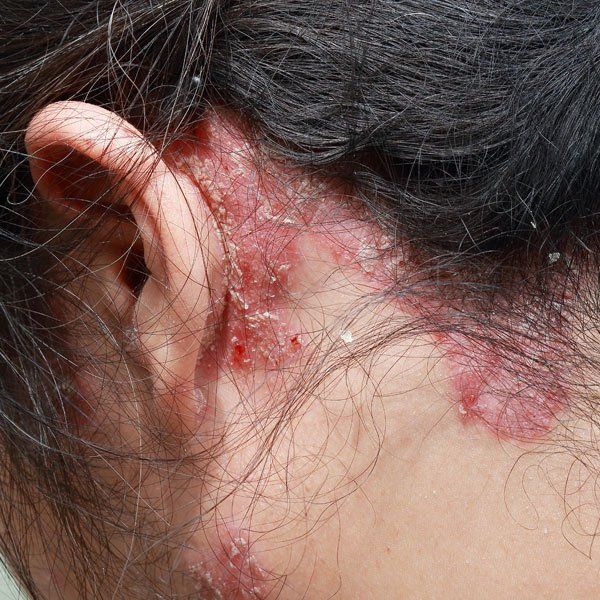What is Psoriasis (Psoriatic Arthritis (PsA))?
Psoriatic arthritis (PsA) is a chronic condition that occurs in people who experience the skin condition psoriasis. The severity of skin problems does not determine if someone will develop the inflammatory joint disease. About 30 percent of people with psoriasis eventually develop PsA. The condition usually appears in people between 30-50 but can develop in children. The start point often depends on when people initially developed psoriasis. PsA often begins about a decade later.
Common Symptoms of Psoriasis
Psoriasis is an autoimmune disorder, as is PsA, and the immune system that targets skin cells and causes the scaly patches can also target the joints. Inflammation within the joints causes pain and stiffness that can worsen over time.
This autoimmune disease is most recognized for its damage to the skin, but it also effects many other parts of the body. Prompt treatment can help to keep the condition under control. However, many symptoms can develop, and the severity can range from barely noticeable to unbearable.
- Swelling that causes sausage-like fingers
- Pitting in the nails
- Stiffness in the back and neck making it difficult to bend
- Sore heels and soles
- Tender elbows
- Fatigue that is most noticeable in the morning
- General stiffness in all joints that worsens in the morning
- Separation of nails from the nail bed
- Eye pain, inflammation, and redness
- Development of IBS
Common Causes of Psoriasis
PsA usually develops in people with psoriasis, but sometimes the patient will not have the skin condition. It is possible for people PsA if people only have relatives with psoriasis. The condition can affect either gender. PsA can potentially develop after a streptococcal throat infection (strep throat). PsA is not contagious.
How Does the Medical Community Treat Psoriatic Arthritis?
PsA patients have not historically undergone the same intensive studies as patients with rheumatoid arthritis (RA) or osteoarthritis. Due to this, there is a lack of understanding of the condition in the medical community. As a result, uncertainty exists about how the condition begins and the best treatment methods.
Most specialists treat the condition as they would RA, and these options may or may not provide relief for the patient. Diagnosing the problem is also not easy and can take longer than it should. A diagnosis may happen faster when the patient has more complications from psoriasis.
Treatment depends on severity level. Often patients are told to live a healthy lifestyle and use basic OTC painkillers as needed. Doctors will often treat more severe cases with anti-rheumatic prescription medications. Biologics with TNF inhibitors may also become necessary. TNF is a naturally occurring protein that can cause inflammation by sending signals to the body. An inhibitor stops the signaling to prevent inflammation.
How Psoriasis Can Be Treated Naturally
The limited availability of treatment options other than prescription medication can make it difficult for people to keep their condition under control. PsA patients may want to consider natural alternatives that many traditional care providers do not use. Alternative healers have many safe options available.
See Your Local Holistic Practitioner. These can include muscle testers like Applied Kinesiologists and Nutrition Response Testers, many of whom are Chiropractors. You can also consider Functional and Integrative Medical Practitioners, many of whom are holistic doctors. Depending on your symptoms, trained Dietitians and Nutritionists can also be an option.
Adding
whole food supplements to your treatment plan adjusts the imbalances in your body. Being under a professional's care will help eliminate trial and error, and wasted money spent on remedies that may not be appropriate for your exact illness. Most holistic practitioners offer a free consultation, so seeing two or three is an option. It would be wise to start here.
- Exercise - Preventing stiff joints relies on adequate exercise. Movement can help people stay flexible, at a healthy weight, and boost energy levels. Exercise also strengthens muscles and improves balance. In addition, avoiding impact or strain on the joints and tendons will make exercise more enjoyable and safer for arthritis patients. Walking is an excellent option, as is yoga, stretching, and water therapy.
- Whole Food Supplements - Alternative healers can offer a wide range of beneficial supplements to consider. Patients can also look at their spice racks for valuable options. Turmeric, Olprima (highly concentrated Omega-3 oil) and high-quality Hemp Oil, have anti-inflammatory benefits.
- Acupuncture - Acupuncturists focus on pressure points that can help reduce pain. Participants may also feel pain relief and have less inflammation due to the boosted blood flow and relaxation effects of the treatment.
- Meditation - Stress can cause the immune system to activate, and this can make autoimmune conditions more severe. Meditation helps people stay mindful and relaxed, so their immune system remains balanced. The process can result in less pain and stiffness with regular participation.
- Hot and Cold Therapy - Many chiropractors offer hot and cold therapy or can guide their patients through the correct use of the treatment at home. The therapeutic option can improve blood flow and reduce inflammation for a better range of motion, reduce swelling, and less pain.
Psoriatic arthritis can seem overwhelming, but it is even more frustrating for those with frequent severe flare-ups from psoriasis. Autoimmune disorders like these will never improve unless the body becomes better balanced, and the immune system is under control. Alternative practitioners offer solutions for this purpose. The natural, safe, and non-invasive options work alongside traditional medical treatments, so people do not need to feel they must choose one or the other.
Additional Resources
- About Psoriatic Arthritis - National Psoriasis Foundation
- Psoriatic Arthritis - American College of Rheumatology
- Overview of Psoriatic Arthritis - National Institute of Arthritis and Musculoskeletal and Skin Diseases
- 20 Natural Options for Treating Psoriatic Arthritis - Medical News Today



